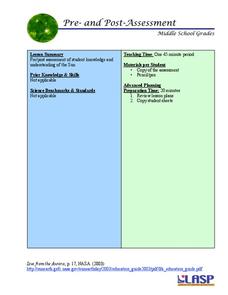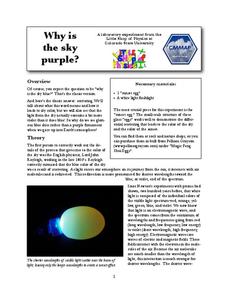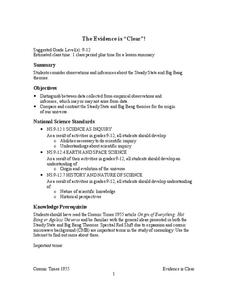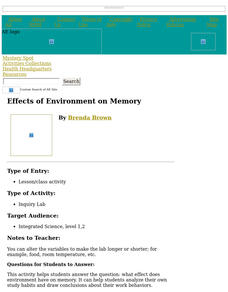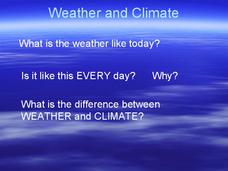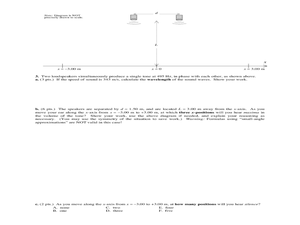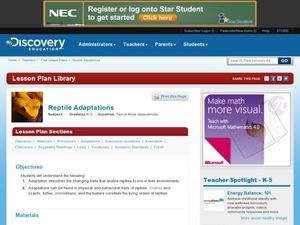California Academy of Science
Kinesthetic Astronomy: Longer Days, Shorter Nights
A lamp, four globes, and some signs taped around the room are all you need to set up a solar system simulation for teaching how Earth's tilted axis creates the seasons. (Sticky dots are also needed, but not mentioned in the materials...
Curated OER
In a Giants Garden
Learners explore the effect of the earths rotation and its relationship to the suns position and the effect that the longer and shorter amount of daylight has on a pumpkin plant which they have planted.
PHET
The Sun: Pre- and Post-Assessment
Want to see how far pupils have come since the beginning of the unit? This activity is designed to be a pre- and post-assessment for a unit on the Sun. The first in a series of 18 that can be combined to form a complete unit. Two...
Colorado State University
Why Is the Sky Purple?
The color of the sky depends on the time of day. Young scholars experiment with scattering different wavelengths of light to recreate the color of the sky. They observe both the longer blue wavelengths and the shorter red and orange...
NASA
The Evidence is “Clear”!
Do you think you know better? Become a scientist and prove it. Scholars review the evidence for two different theories of the origins of the universe. They notice the empirical observations as well as the inferences to determine which is...
Curated OER
Structural Geology Laboratory
Young scholars explore modeling of geologic structures in experiments. They study how compressive and tensile forces produce these structures. The compression makes the flatlying strata shorter and tension make the strata longer.
Curated OER
Piglets
Students are asked have they ever seen a pig? They are asked what are young pigs called? Students are given the Pigs Display Sheet. They see that on the sheet there are two piglets and their mother. Students are told that mother pigs are...
Curated OER
Seed Selection for Genetic Variation
Students will research the origin of corn, analyze factors that contribute to shorter and longer growing seasons, and use the scientific method to answer the question: Did seed selection contribute to the successful movement of corn from...
Curated OER
How Long is a Hot Dog? Weight, Weight! Don't tell me!
Primary learners participate in activities that help them explain how different things are measured. They create their own access number chart.
Curated OER
Effects of Environment on Memory
Students explore the effect that environment has on memory. They analyze their own study habits and draw conclusions about their work behaviors. Baseline capacity is established for the subjects' ability to memorize an increasing series...
Curated OER
Measure
Students are asked what activities or things that they do each day. They are then asked do you do that in the morning, afternoon, or night? Students are then asked which of those things do you do first, second, third, and etc.
Curated OER
The Flower and the Fly
It's like a biological "Beauty and the Beast!" The fascinating mutualism between a South African meganosed fly and a deep-throated geranium builds a case study in coevolution for your biology buffs to analyze. After reading about this...
Astronomical Society of the Pacific
Toilet Paper Solar System
Can we model how large the solar system really is? Attempt an astronomical feat with a hands-on-activity that uses a roll of toilet paper. Young scientists measure the distances of the planets from the sun to create a scale model of the...
Curated OER
What Causes Day and Night?
Why do we have four seasons? A series of questions about the Earth's orbit and its impact on seasons challenge Earth science students.The second page of the resource has nine multiple choice questions, such as "One year on Earth is one...
Curated OER
Weather and Climate
It's hot today, but is that the weather or the climate? This colorful presentation isolates both concepts to allow for better understanding by covering the positioning of the planet, making comparisons of land versus water, and looking...
Curated OER
Can You Make a Muscle?
Why are muscles important? Third graders study the different kinds and functions of muscles in the human body. After drawing arrows in an illustration to indicate where a muscle contraction would occur, they do their own experiment about...
Glynn County School System
Multi-Wavelength Astronomy
Take a look at astronomy through the light lens. From radio to gamma, light waves exist in every corner of the universe. An enlightening PowerPoint presentation gives an overview of the different categories of light and then discusses...
Curated OER
Physics Midterm Exam #3 - Electromagnetic Radiation
True-false and multiple-choice questions are posed in Part A of this exam, covering the topic of electromagnetic radiation. In Part B, problems relating to refraction must be solved. This is a well-rounded exam that will help you...
NASA
Launch Altitude Tracker
Using PVC pipe and aquarium tubing, build an altitude tracker. Pupils then use the altitude tracker, along with a tangent table, to calculate the altitude of a launched rocket using the included data collection sheet.
Nuffield Foundation
Going up in Smoke
Don't let all your hard work go up in smoke. Pupils conduct an experiment to see the harmful effects of cigarette smoke. They observe how smoke changes the color of white wool and an indicator solution.
Glynn County School System
Light, History, Gravity, Distance, Relativity, and Space-Time
Let the star's color be the guide! The color of a star indicates its temperature and its mass and distance affect the gravitational force. The lesson presentations address these concepts as well as how the theory of special relativity...
Curated OER
Hypothesis
Students study how to write several hypothesis. In this hypothesis activity students divide into groups and complete several hypothesis.
Curated OER
Evolution Number Two
Are you looking for evidence that your high schoolers are adapting to the concepts of natural selection and evolution? Assess their knowledge with a pretest and posttest. Naturally, you can select and adapt the learning exercise to be...
Curated OER
Reptile Adaptations
Students research animal adaptations. In this adaptations lesson, students research the physical and behavioral adaptations of animals. Students create a diagram of their animal labeling it's adaptations.




